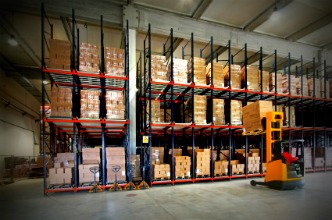 There are many different types of suppliers out there. Before making your final supplier choice, it’s best to know what kind of business you’re partnering with and how much they have their hands on the actual product you’re getting. Knowing this information will help you strike up the ideal business partnership.
There are many different types of suppliers out there. Before making your final supplier choice, it’s best to know what kind of business you’re partnering with and how much they have their hands on the actual product you’re getting. Knowing this information will help you strike up the ideal business partnership.
The most common types of bulk oil suppliers are as follows. These categories are typical across the board for bulk food ingredients used in manufacturing.
Types of Ingredient Suppliers
1. The Manufacturer
This is the company that makes the product itself. Depending on who you speak with, there are two different versions of bulk oil manufacturers that exist: the product manufacturer and the oil manufacturer.
Product Manufacturer
The product manufacturer is the company that purchases the oil in bulk and packages it into different sizes like tankers, totes, drums and food service or retail bottles. They have large domestic storage space and full-line packaging facilities set up. They can ship you inventory by the truckload or by the pallet.
This is a common type of supplier in the US, and is considered the “highest level on the food chain” in terms of functional suppliers that most US manufacturing businesses would choose. In the US, there are only 4-6 major olive oil suppliers, making most of them also national suppliers.
Centra Foods would be a good example of this type of supplier.
Oil Manufacturer
The oil manufacturer is the company that presses the oil. In the case of bulk olive oil, this most often is the large co-operative mills located over seas. As a US manufacturing business, it’s unlikely that you would work with this level of supplier; most often they only sell in large flexitanks and/or require that you buy many tens or hundreds of tanks each year. You may, however, hear this term used from time to time and it’s important to understand the difference.
If you buy at a retail level or in smaller volumes, this could also be a term used the growers and pressers of Extra Virgin Olive Oil located domestically in California, Texas or other states.
2. The Broker
A broker is an individual that sells you someone else's product. They do not physically own or hold the product at anytime. It is typically shipped from a separate warehouse directly to your facility. They receive a commission on the sale, but they are most often working as a separate sales person for many different products. In the bulk olive oil realm, most often brokers only sell full containers, because they’re most commonly importing from overseas. Brokers are very commonly used for other oil commodity items like soybean and conventional canola oil.
The good thing about a broker is that they can “shop around” with a few different manufacturers to be able to offer you competitive pricing. The good one’s are highly specialized and know they’re industry inside and out.
3. The Distributor
A distributor re-sells a finished product. They take full ownership of the product form the manufacturer and ship it to you from their own warehouse. They often have smaller minimum orders because, while they do buy in large volumes, they split up the product between many different customers.
The distributor will often have slightly higher product pricing than a manufacturer or a broker. However, they are a “one-stop-shop”, and can make up the difference by saving you a lot on shipping and the time it takes to order from many different suppliers.
This set up is, quite literally, the closest that you can get to adding an additional purchaser to your team. You will work with one account manager who will help you make sure that you get all of your ingredients in time for production. And if anything goes wrong, you’ve got one person to call to help you right the situation.
Want a suggestion for a good ingredient distributor in the manufacturing industry? Try Food Guys in Oregon.
Choose The Right Kind Of Oil Supplier For Your Business
Keep in mind, whichever supplier you choose could fall in more than one of these categories. Depending on how much you order, where your product ships from and if it is re-packed will typically determine what kind of supplier they’re acting as.
Also, there is no one type of supplier that’s better than the other. Certain business models and types of orders are simply better suited for a particular type of supplier. It’s to your advantage to find the right fit for your own business!
Want to get information like this delivered to your inbox? Subscribe to this blog!
Topics: Suppliers












